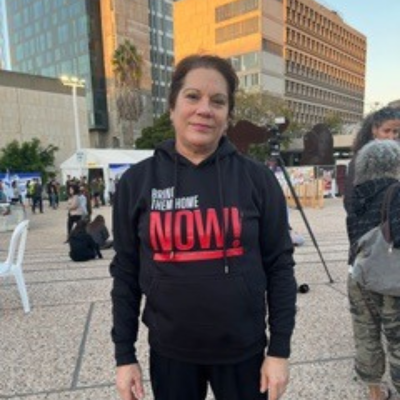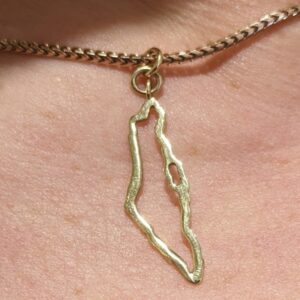Recently, I was unexpectedly rebuked by a friend and colleague, an Israeli rabbi whom I hold dear, who was visiting New York. He pointed to the charm on the necklace I was wearing, which is an outline of Israel. It is small in size, so I had not expected anyone to notice the outline it showed — or perhaps I was kidding myself into believing it didn’t matter. Its shape shows the entire Land of Israel, with no demarcation for the West Bank or Gaza. “Amy,” he said with chagrin, “you know that shows the occupied territory as part of the shape of Israel.” His tone and his facial expression conveyed disbelief that I would wear this. “I know,” I said, “but I was hoping no one would notice. Truth is, an Israeli friend gave this to me when I recently visited Israel, so I cherish it — after all, this was during a solidarity mission shortly after the horrific events of October 7.”
I have been wearing that charm since that visit, as my heart has been heavy with grief and fear for my friends in Israel and for all those in harm’s way at this time of war. Yet, we are now increasingly concerned about the way the war is portrayed in the media and the public square. Words matter, and the harm to the Jewish community has spread through words. How could the horrific events of October 7 and since be portrayed with the “spin” that Israel is to blame for all of it? The war of words has become a distressing addition to the violence that is causing so much suffering.
The complexity of the situation resides within a very sick, very troubled larger world. There are many days when, in outrage and distress, I exclaim aloud, “Why do so many people believe misinformation?” What is truth, and how do our language and our public conversation subvert the pursuit of shared truth? In a time when many news stories that are deep and complex are perverted into simple formulas of “us vs. them” or “good vs. bad,” it can feel like the very foundation of our shared society is slippery.
Find more commentaries on Tazria.
How can we get our footing? How can the wisdom of our sages guide us? Surprisingly, we find wisdom regarding the dangers of distorted and harmful speech in commentaries for Parashat Tazria and the subsequent portion, Metzora. On the literal level, Tazria’s detailed descriptions of frightening diseases may seem outdated for modern readers, yet our ancestors’ fears of contagion are resonant in our time. Rabbi Eli Garfinkel writes:
The biological identity of tzara’at is ultimately unimportant, as both our biblical and rabbinic ancestors considered it to be a spiritual and not a medical problem. Spiritually, then, one could reasonably ask why laws relating to leprosy are worth hours of time in synagogue and the beit midrash. One answer is that while this communicable impurity is no longer relevant in modern times, the concepts of illness, recovery, and care for those who are ill have always been relevant and always will be.[1]
This understanding of sickness as potentially a spiritual problem leads to rabbinic commentaries that relate the ethics of caring for each other to the realm of speech. The words we speak and publish and share may soothe our spiritual and emotional wounds when spoken in kindness, while the opposite is sadly also true. Speech has the potential to “sicken” us, as individuals and as a society when spoken in malice, betraying truth and/or lacking kindness. The rabbis of the Talmud understood the descriptions of leprosy and infectious disease to apply to the disease of harmful, malicious speech. Rashi comments on Leviticus 13:46:
HE SHALL ABIDE SOLITARY — This means that people who are unclean from other causes than that of leprosy shall not abide with him (Pesachim 67a; cf. Sifra). Our Rabbis said: Why is he (the leper) treated differently from other unclean persons that he should abide solitary? They replied: Because he, by slanderous statements (cf. Numbers 12:10), parted man and wife, or a man from his friend, he must be parted from everybody (Arakhin 16b).
Find more commentaries on Social Justice, Leadership, and Philosophy.
Our public discourse today, particularly in the realm of political speech, is ill, filled with misinformation, untruths, and nastiness. When we ask, “What is truth?” and “How does our language and our public conversation subvert the pursuit or sharing of truth?”, we are seeking to diagnose a painful sickness in our world today. Rabbi Eli Garfinkel reflects on this in his commentary “Eretz Yisrael: Tzara’at and Malicious Gossip”:
The affliction of tzara’at has always been connected with the concept of leshon hara, malicious gossip or true but hurtful speech. In the Torah, tzara’at is seen as a punishment for spreading rumors; God gave Miriam tzara’at when she publicly complained about Moses’ marriage to a Cushite woman. In the Talmud, Resh Lakish (first century Palestine) took the matter further, making a phonetic connection between the word metsora (a person who has tzara’at) and a motzei shem ra, one who commits the sin of slander (B. Arakhin 15b).
Kikar Rabin (Rabin Square) in Tel Aviv is a poignant reminder of the power of malicious speech. Formerly known as Kikar Melakhim (Kings Square), it was renamed in memory of Prime Minister Yitzhak Rabin, who was assassinated there by an ultranationalist zealot on November 4, 1995. Rabin’s murderer drew inspiration from those who called the prime minister a Nazi, a traitor, and a “pursuer” for signing the Oslo Accords with the Palestinians. By calling Rabin a pursuer, extremists were saying that there was a halakhic obligation to kill him. In halakhic terminology, a pursuer (rodef) is one who can be legally killed to prevent the death of the innocent.[2]
Nearly every day, as I read or watch the news, I am filled with upset and worry for our world. So much of our society’s current malaise emanates from malicious speech. Where is the relief, the cure, and the future? Here in the commentaries on Tazria, our sages remind us that this is an age-old problem, as ancient as humanity itself. Fortunately, we know the medicine and the cure: caring, concern for all people, honesty and truth, and the pursuit of justice with a shared vision of a world repaired. This year, as we reflect on this small piece of Torah, we recommit ourselves to do all we can to help our world cure the sickness of malicious speech. By working together to heal this age-old malady, we can help to recover our world’s health and thriving.
[1] JPS Jewish Heritage Torah Commentary. Rabbi Eli L. Garfunkel. Jewish Publication Society. 2021. Page 185
[2] ibid. Page 193
Rabbi Amy Joy Small recently retired from serving as Senior Rabbi of Ohavi Zedek Synagogue in Burlington, VT. She is a Senior Rabbinic Fellow of the Shalom Hartman Institute and regularly attends their rabbinic programs. She was ordained from the Reconstructionist Rabbinical College in 1987 and served on the board of the Reconstructionist Rabbinical Association 2001-2007, including as president 2003-2005. Rabbi Small resides in New Jersey, where she is discovering the next chapter of her rabbinate.


